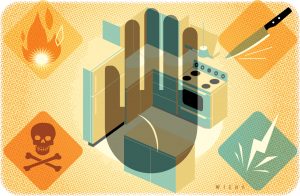If you are a beginner in the kitchen, or a pro that needs a refresher, read below for some of our suggested kitchen safety practices.
FALL SAFETY
- Ensure that the kitchen floor is clear of toys or other items
- Clean up spills immediately to avoid slippery floors
- Use a step stool to reach high shelving
SHARP OBJECT SAFETY
- Watch out for sharp edges on scissors, knives, potato peelers, broken glass, etc.
- Unplug the blender or mixer before touching or cleaning the sharp blades
- When using knives, always cut away from your body. Make sure to use a cutting board.
BURN SAFETY
- Burning skin is a common kitchen injury. Make sure to pour hot water out of pots by turning the pot handles away from
- Take caution when lifting lids from hot food – hot steam can burn!
- Make sure to wear appropriate clothing in the kitchen. Avoid loose sleeves or sweaters. Wear shoes that cover your feet.
- Use oven mitts or potholders to handle hot dishes
- Never add water to a pan with hot oil in it. The oil may splatter and burn.
- Burn first aid: If on fire, stop, drop, and roll. Hold the area under cool running water and cover the burn with a clean, dry sheet
- Never stick a fork or knife into a toaster while plugged in to avoid electrocution.
FIRE SAFETY
- Don’t leave the kitchen while pots & pans are on the stove. Turn off burners as soon as you are finished cooking.
- Keep a fire extinguisher in or near the kitchen
- Tie back long hair to prevent it from catching on fire
- Keep electrical appliances and cords away from water and hot surfaces
- Grease fires should be controlled with baking soda. Do not use water.
- Electrical fires should be controlled with a fire extinguisher. Do not use water.
HYGIENE TIPS
- Wash your hands with warm, soapy water before and after cooking
- Do not use the same cutting board or surface to cut meats, fruits, and vegetables. This can cause cross-contamination and salmonella poisoning.
- Rinse fresh fruits and vegetables with water before eating.
- Do not let perishable food sit out for long periods of time or they may spoil.
CHILD SAFETY
- Children should be supervised at all times in the kitchen
- Store cleaning supplies, chemicals, and matches in a safe place with latches or child-proof locks
- Turn pot handles towards the back of the stove so young ones can’t reach them
- Make sure children do not put their hands in the mouths after touching raw food like cookie dough or meat
